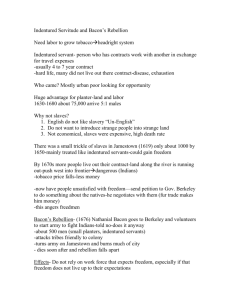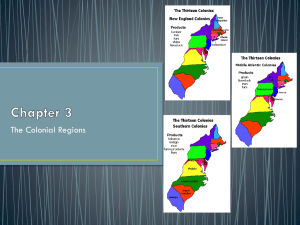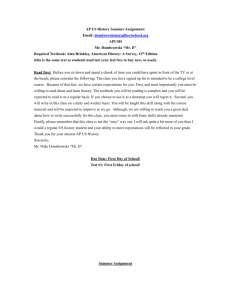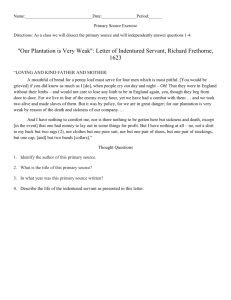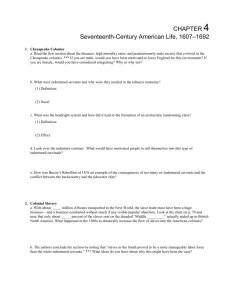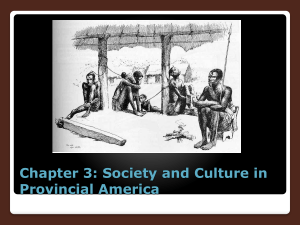File - Coach Sponsel's AP United States History
advertisement
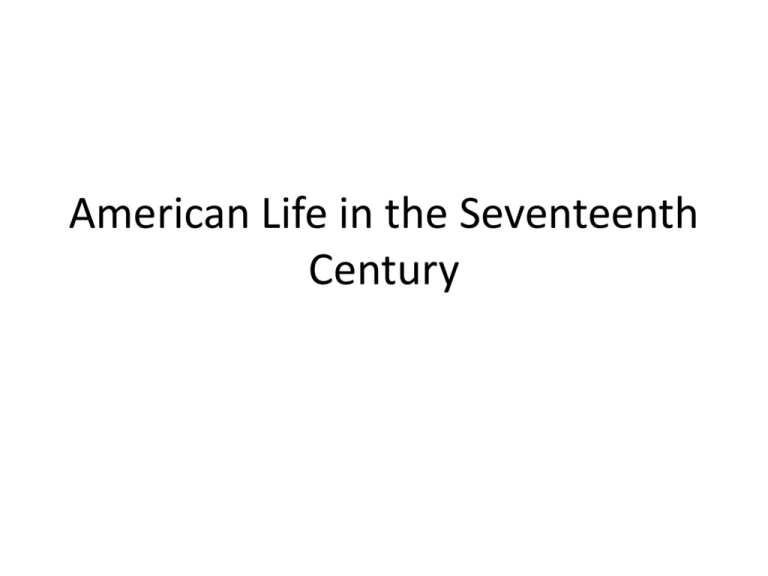
American Life in the Seventeenth Century Life in the Chesapeake • Illnesses • Life expectancy • Men to Women Ratio 6:1 Indentured Servants Indentured servants became the first means to meet this need for labor. In return for free passage to Virginia, a laborer worked for four to five years in the fields before being granted freedom. The Crown rewarded planters with 50 acres of land for every inhabitant they brought to the New World. Naturally, the colony began to expand. That expansion was soon challenged by the Native American confederacy formed and named after Powhatan ) Headright System: Plantation owners were given 50 acres for every indentured servant they sponsored to come to America. Indentured Contract: Served plantation owner for 7 years as a laborer in return for passage to America. Freedom Dues: Once servant completed his contract, he/she was freed….They were given land, tools, seed and animals. However, they did not receive voting rights. What factors led to the introduction of African slavery replacing indentured servitude as the labor force in the American Colonies? Bacon’s Rebellion (1676 - 1677) Nathaniel Bacon represents former indentured servants. Governor William Berkeley of Jamestown •Involved former indentured servants •Not accepted in Jamestown •Disenfranchised and unable to receive their land •Gov. Berkeley would not defend settlements from Indian attacks •Nathaniel Bacon acts as the representative for rebels •Gov. Berkeley refused to meet their conditions and erupts into a civil war. •Bacon dies, Gov. Berkeley puts down rebellion and several rebels are hung Consequence of Bacon’s Rebellion Plantation owners gradually replaced indentured servants with African slaves because it was seen as a better investment in the long term than indentured servitude. Trade Enumerated Goods •Lumber •Tobacco •Rice •Indigo •Furs To England from Colonies Manufactured Goods •Furniture •Clothing •Colonials had not factories. From England to Colonies Slaves captured in Africa Slaves aboard ship—Middle Passage •Slavery has been practiced since the beginning of documented history. •Slavery introduced by the Spanish into the West Indies after Columbus’s discovery of America. •Spanish and Portuguese expanded African slavery into Central and South American after enslaved Indians began dying off. •In 1619, the first recorded introduction of African slaves into what would become the United States was in the settlement of Jamestown……Only 20 slaves were purchased…. This is called the Middle Passage • 250 insurrections have been documented; between 1780 and 1864. •91 African-Americans were convicted of insurrection in Virginia alone. Slave Revolts Stono County Rebellion •September 9, 1739, twenty black Carolinians met near the Stono River, approximately twenty miles southwest of Charleston. They took guns and powder from a store and killed the two storekeepers they found there. •"With cries of 'Liberty' and beating of drums” headed south toward Burned houses, and killed white opponents. •Slaveowners caught up with the band of 60 to 100 slaves. 20 white Carolinians and 40 black Carolinians were killed before the rebellion was suppressed. Slave Revolts/Stono plantation owners to develop a series of slave laws/codes •Slaves were not taught to read or write •Restricted to the plantation •Slaves could not congregate after dark •Slaves could not possess any type of firearm •A larger slave population than white in some states Slave owners wanted to keep their slaves ignorant of the outside world because learning about life beyond the plantation could lead to more slave revolts and wanting to escape. Slave Laws Southern Society • • • • • Planter class/Plantations Gap between rich and poor Both worked extremely hard Life expectancy Role of Women New England Society • • • • Life Expectancy Role of women Towns- Well organized Built on “God and Cod” Puritans were Calvinists God was all powerful and all-good. Predestination: God was all-knowing and knew beforehand who was going to heaven or hell. "elect" were chosen by God to have eternal salvation "Good works“ did not determine salvation (like Catholic Church) One could not act immoral since no one knew their status before God. John Winthrop: Governor of Mass. Bay Colony 1. Covenant Theology: Winthrop believed Puritans had a covenant with God to lead new religious experiment in New World: "We shall build a city upon a hill" 2. His leadership helped the colony to succeed. Religion and politics: "Massachusetts Bible Commonwealth“ 3. Governing open to all free adult males (2/5 of population) belonging to Puritan congregations; Percentage of eligible officeholders was more than in England. 4. Eventually, Puritan churches grew collectively into the Congregational Church 1. Non-religious men and all women could not vote 2. Townhall meetings emerged as a staple of democracy 3. Town governments allowed all male property holders and at times other residents to vote and publicly discuss issues. Majority-rule show of hands. 3. Provincial gov't under Governor Winthrop was not a democracy 4. Only Puritans -- the "visible saints" -- could be freemen; only freemen could vote 5. Hated democracy and distrusted non-Puritan common people. 6. Congregational church was "established": Non-church members as well as believers required to pay taxes for the gov't-supported church. Contributions to American character Democracy (within church) via town meetings and voting rights to church members (starting in 1631) Townhall meetings, democracy in its purest form. Argued against slavery on moral grounds Ideas lay foundation for later reform movements: abolition of slavery, women's rights, education, prohibition, prison reform, etc. Protestant work ethic: those who were faithful and worked hard and succeeded were seen favorably by God The decline of Puritanism First generation Puritans began losing their religious zeal as time went on. Puritan population moved out of town away from control of church. Too much religious intoleration Children of non-converted members could not be baptized. "Half-Way Covenant",1662: sought to attract more members by giving partial membership Puritan churches baptized anyone and distinction between the "elect" and other members of society subsided. Salem Witch Trials, 1692 -- The decline of Puritan clergy Half-Way Covenant • 1st generation’s Puritan zeal diluted over time • Problem of declining church membership • 1662: Half-Way Covenant – partial membership to those not yet converted (usually children/ grandchildren of members) • Eventually all welcomed to church, erased distinction of “elect” The Salem Witch Trials took place in Salem, Massachusetts from March to September 1693, was one of the most notorious episodes in early American history. Based on the accusations of two young girls, Elizabeth Parris and Abigail Williams. Under British law and Puritan society those who were accused of consorting with the devil were considered felons, having committed a crime against their government. The punishment was hanging. Causes disapproval of Reverend Parris land disputes between families, Indian taught witchcraft to girls. Girls caught dancing, began to throw fits and accuse people of bewitching (To put under one's power by magic or cast a spell over) them to not get in trouble. 19 hung, 1 pressed, 55 confessed as witches and 150 awaited trial. Shows the strictness of Puritan society Shows how a rumor can cause hysteria even to illogical thinking. Later, many people involved admitted the trials & executions had been mistake. •Parliament offered the monarchy to William and Mary in 1686. •This was known as the "Glorious Revolution." (Revolution because they overthrew the last Catholic monarch, Glorious because no one died.) •Had to agree to certain conditions which limited their power. No standing armies during peace time. Parliament elected by the people and law making body King cannot tax without the permission of Parliament. Guarantees of trial by jury, fair and speedy trial, freedom from excessive bail, cruel and unusual punishment. Promoted limited, ordered & representative government. Influenced our “Bill of Rights” The English colonists who settled America brought with them three main concepts: 1. The need for an ordered social system, or government. 2. The idea of limited government, that is, that government should not be all-powerful. 3. The concept of representative government or a government that serves the will of the people. Background Great Awakening New Denominations Political & social implications • Puritan ministers lost authority (Visible Saints) • Decay of family (Halfway Covenant) • Deism, God existed/created the world, but afterwards left it to run by natural laws. Denied God communicated to man or in any way influenced his life…get to heaven if you are good. (Old Lights) • 1740s, Puritanism declined by the 1730s and people were upset about the decline in religious piety. (devotion to God) • “New Lights”: Heaven by salvation by grace through Jesus Christ. Formed: Baptist, Methodists • Led to founding of colleges • Crossed class barriers; emphasized equality of all • Unified Americans as a single people • Missionaries for Blacks and Indians The Enlightenment • An intellectual movement which stresses reason over religion • Newton focuses on understanding natural laws by using the scientific method • John Locke’s Compact Theory: We all have natural rights and it’s gov. job to protect them • In the colonies, the most educated (in the cities) follow the Enlightenment • Ben Franklin establishes the Amer. Philosophical Society in 1743 • Most Enlightenment thinkers consider themselves Deists (God set laws into motion and left it to work) Higher Education Harvard, 1636—First colonial college; trained candidates for ministry College of William and Mary, 1694 (Anglican) Yale, 1701 (Congregational) Great Awakening influences creation of 5 new colleges in mid-1700s College of New Jersey (Princeton), 1746 (Presbyterian) King’s College (Columbia), 1754 (Anglican) Rhode Island College (Brown), 1764 (Baptist) Queens College (Rutgers), 1766 (Dutch Reformed) Dartmouth College, 1769, (Congregational) The Awakening's biggest significance was the way it prepared America for its War of Independence. In the decades before the war, revivalism taught people that they could be bold when confronting religious authority, and that when churches weren't living up to the believers' expectations, the people could break off and form new ones. Through the Awakening, the Colonists realized that religious power resided in their own hands, rather than in the hands of the Church of England, or any other religious authority. After a generation or two passed with this kind of mindset, the Colonists came to realize that political power did not reside in the hands of the English monarch, but in their own will for selfgovernance Impact of the Great Awakening • Democratizes religion • Revivalist clergy known as New Lights…rationalist clergy known as Old Lights. • Presbyterian and Baptist churches gain in membership…Anglicans and Congregationalists (Puritans) lose out • New colleges established because of competition between the two sides (Princeton, Columbia, etc…) • Revivalism spreads to Africans and Natives. • Gives some women more religious influence. • Empowers ordinary people to question established religious (and political) authority. Colonial Society on the Eve of Revolution 1700-1775 Structure of Colonial Society • 18th century society very equal compared to Europe (except for slavery) • Most Americans were small (“yeoman”) farmers • Most striking feature: opportunity for “rags to riches” Structure of Colonial Society • Yet compared to 17th century, some barriers to mobility 4th: Lesser tradesmen, manual workers, hired • New social pyramid: hands – Top: Wealthy merchants, lawyers, clergy, officials joined large planters, aristocrats at top 5th: Indentured servants and “jayle birds,” convicts exiled to America by punitive English justice system – 2nd: Lesser professional men th: Black slaves – some 6 rd – 3 : Yeoman (own land) attempts to halt imports farmers, though farm sizes for fear of rebellion decreasing due to family increase, lack of new land Workaday America • 90% of population involved in agriculture ~ led to highest living standard in world history • Fishing pursued in all colonies, major industry in New England ~ Stimulated shipbuilding • Commerce successful, especially in New England ~ Triangular trade was very profitable Workaday America • Manufacturing was secondary: Lumbering most important, also rum, beaver hats, iron, spinning/weaving • England reliant on American products (tar, pitch, rosin, turpentine) to build ships and maintain mastery of seas • 1730s: growing American population demanded more English products Workaday America • However, English population did not need more imports from America: trade imbalance – Americans needed to find non-English markets for their goods • Trade w/ French West Indies met need • 1733: Parliament passes Molasses Act to end trade with French West Indies • Americans responded by bribing and smuggling, foreshadow of revolt against government Great Game of Politics • 1775: 8 colonies had royal governors, 3 under proprietors (MD, PA, DE), and 2 under self-governing charters (CT, RI) • Used bicameral legislatures – upper house (council) chosen by king, lower house by elections • Self-taxation through elected legislatures was highly valued • Conflicts between Governors & colonial assemblies: withheld governor’s salary to get what they wanted, had power of purse Great Game of Politics • 1775: all colonies had property requirements for voting, office holding • Upper classes afraid to give vote to “every biped of the forest,” ½ adult white males had vote • Not true democracy, but more so than England Colonial Folkways • Mid-1700s similarities of colonies: – English in language/customs – Protestant – Some ethnic/religious tolerance – Unusual social mobility – Some self-government – 3,000-mile moat separated them from England
